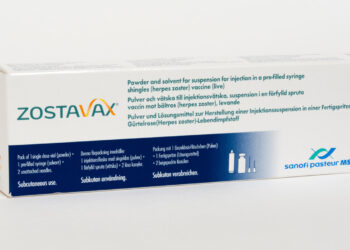SAN FRANCISCO — Older patients’ survival in metastatic pancreatic cancer had a significant association with baseline vulnerabilities and quality-of-life (QoL) factors, beyond performance status, data from a randomized study showed.
Baseline nutrition status had the strongest association with overall survival (OS), showing a 17% decrease in the survival hazard with each unit improvement in nutrition status. Physical functioning, depression, and score on a QoL instrument all had significant associations with survival, reported Efrat Dotan, MD, of Penn Medicine in Philadelphia, at the American Society of Clinical Oncology (ASCO) Gastrointestinal Cancers Symposium.
“[This] is the first elderly-specific clinical trial to evaluate the benefit of chemotherapy for vulnerable older patients with newly diagnosed metastatic pancreatic cancer,” said Dotan. “Baseline geriatric vulnerabilities and quality-of-life scores correlate with overall survival and are not captured by physician-rated performance status.”
The findings suggest that “supportive care and management of geriatric vulnerabilities at baseline may improve outcomes and help identify patients who can benefit from chemotherapy,” she added.
Session moderator Flavio Rocha, MD, of Oregon Health and Science University in Portland, asked how the findings might be applied to patients who are surgical candidates with earlier-stage disease.
“As a surgeon, I frequently see more elderly patients, some of whom are frail and some who are not,” said Rocha. “It’s very difficult for us to decide who is going to be the operative candidate from that standpoint.”
The challenge in applying the geriatric assessment to earlier-stage disease lies in the need to separate disease-related factors from age-related factors.
“It’s really tough at diagnosis in the earlier setting,” said Dotan. “I feel the neoadjuvant chemotherapy approach helps with identifying these factors and understanding which patients are really frail due to disease more than aging, but I think we really need to do more research to understand which variables are relevant and should be addressed at baseline.”
An unidentified member of the audience asked whether investigators examined outcomes in patients who refused treatment.
“One of the things we’re challenged with is trying to tell patients, and more importantly their families, that treatment may actually be detrimental,” said the speaker.
At the outside, investigators wanted to collect data on all patients who completed a geriatric assessment, including those who refused treatment, but were unable to do so “for a variety of reasons,” said Dotan.
“Another [issue] is that our geriatric assessment was something that we built on the basis of clinical factors,” she continued. “Are these absolutely the right factors to use? It’s hard to say, but we really don’t have any other validated tools to select patients. That’s one of the limitations.”
“Maybe the next study will actually look more thoroughly at the whole patient population to understand the benefits. Potentially, with additional supportive measures, could we improve the outcomes?” she added.
Dotan reported findings from a prespecified secondary analysis of the GIANT study, a randomized trial that compared two chemotherapy regimens for untreated metastatic pancreatic cancer in patients, ages 70 or older. The trial was the first to examine the potential benefits of chemotherapy in an older, vulnerable patient population with metastatic pancreatic cancer, she said.
The primary endpoint was OS, and the results showed no difference between the two treatment arms. Both groups had poor median survival of 4.4 to 4.7 months. In contrast, patients who received at least 4 weeks of chemotherapy lived almost twice as long.
A stratified analysis showed a significant association (P
The current analysis included 176 patients. Comparison of baseline characteristics showed no imbalances in treatment groups with respect to performance status, vulnerability (older age, number of comorbidities, cognition, and function), and number of vulnerabilities.
Investigation of correlations between the baseline geriatric assessment and QoL with OS identified four significant associations, which remained significant in a multivariate analysis:
- Instrumental Activities of Daily Living: OR 0.85 (P=0.073)
- Mini-Nutritional Assessment (MNA): HR 0.86 (P=0.0039)
- Geriatric Depression Scale (GDS): HR 1.07 (P=0.029)
- FACT-Hepatobiliary: HR 0.99 (P=0.026)
Further analysis of the relationship between components of the geriatric assessment and OS, using predefined cutoff values, showed a significant association with the MNA (median OS 2.7 to 15.0 months across range of values, PP=0.06). Higher scores on all domains of the FACT instrument had significant correlations (P
An evaluation of baseline factors and risk of grade 3 toxicity showed significant correlations with white blood cell count, GDS score, and BMI in both univariate and multivariate analyses.
Disclosures
The study was supported by the National Cancer Institute.
Dotan disclosed relationships with Agenus, Amgen, Ipsen, Merck, Merus, Olympus, Dragonfly Therapeutics, Gilead Sciences, Kinnate Biopharma, Leap Therapeutics, Eli Lilly, Lutris, NGM Pharmaceuticals, Relay Therapeutics, and Zymeworks.
Rocha disclosed relationships with AstraZeneca, Histosonics, Medtronic, Oncosil, and Lynx Group.
Primary Source
ASCO Gastrointestinal Cancers Symposium
Source Reference: Dotan E, et al “Effect of baseline geriatric and quality of life assessments on treatment outcomes in ECOG-ACRIN EA2186 (GIANT): A randomized phase II study of gemcitabine and nab-paclitaxel compared with 5-fluorouracil, leucovorin, and liposomal irinotecan in older patients with treatment-naïve metastatic pancreatic cancer” ASCO GICS 2025; Abstract 676.
Source link : https://www.medpagetoday.com/meetingcoverage/mgics/113941
Author :
Publish date : 2025-01-26 14:00:00
Copyright for syndicated content belongs to the linked Source.














